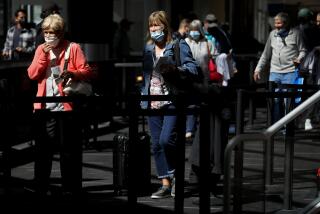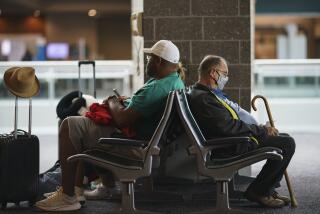All fliers are better off taking precautions against blood clots
- Share via
Healthy airline passengers -- not just those with chronic problems -- should take precautions to avoid dangerous blood clots on long flights, according to new guidelines from a group of cardiopulmonary specialists.
“Never before have there been guidelines for air travel,” says Dr. Holger Schunemann, a senior editor of the guidelines and associate professor of medicine at the University at Buffalo School of Medicine and Biomedical Sciences in New York. The guidelines released last month by the American College of Chest Physicians were developed in response to travelers’ concerns, he says.
Otherwise-healthy passengers have developed blood clots in deep veins, a condition called deep vein thrombosis, or DVT. If a clot travels to the lungs, it creates a potentially fatal condition called venous thromboembolism, or VTE.
Among the panel’s recommendations for all passengers on flights longer than six hours:
* Avoid tight clothes around the waist and lower extremities.
* Stretch frequently while seated, especially the calf muscles (“whenever you think about it,” Schunemann says). When possible, stand in the aisle and move around, he advises.
* Avoid dehydration. Schunemann says the guidelines give no specifics, but when he flies long distances, “whenever the flight attendants come around I will get water.”
* Don’t rely on aspirin to prevent clots. “There is some common thought among patients and some clinicians that aspirin will prevent clots during travel,” Schunemann says, “but we did not identify any evidence that aspirin would prevent clots during air travel.”
The panel made additional recommendations for people with a personal or family history of blood clots, cancer patients, pregnant women and anyone who recently underwent surgery:
* Consider wearing a graduated compression stocking. The panel recommends stockings that fit properly, fall below the knee and provide 15 to 30 millimeters mercury (mmHg) of pressure (the standard measurement of pressure) at the ankle. The stockings are sold online and in medical supply stores; the packaging should specify how much pressure is provided.
* Ask your doctor about prescribing low molecular weight heparin, an anticoagulant. Another drug with anti-clotting properties, fondaparinux (brand name Arixtra), also could work, says Dr. Jack Hirsh, chairman of the panel and a physician at the Henderson Research Centre in Hamilton, Canada.
* Seek personal recommendations from your doctor, the panel says.
Blood clots and similar conditions have received much media attention, but the panel’s review of more than 20 studies found a questionable association between prolonged travel and VTE. Overall, the risk of clots is low, the panel says.
One study reviewed by the panel included 878 travelers who had flown an average of 39 hours in about 22 days. The researchers detected VTE in 1% of the subjects; of those people, all had spent at least 24 hours total in the air.
The new recommendations focus on flights lasting six hours or longer, Schunemann says, because the panel found “little evidence” of an increased risk for blood clots on shorter flights.
“I’m definitely in agreement with the guidelines,” says Dr. Mahmood Peshimam, who practices in Fountain Valley.
He says many travel medicine specialists have provided similar advice for some time. Now, though, travelers have those recommendations in writing.
Healthy Traveler appears every other week. Kathleen Doheny can be reached at kathleendoheny@earthlink.net.
More to Read
Sign up for The Wild
We’ll help you find the best places to hike, bike and run, as well as the perfect silent spots for meditation and yoga.
You may occasionally receive promotional content from the Los Angeles Times.






